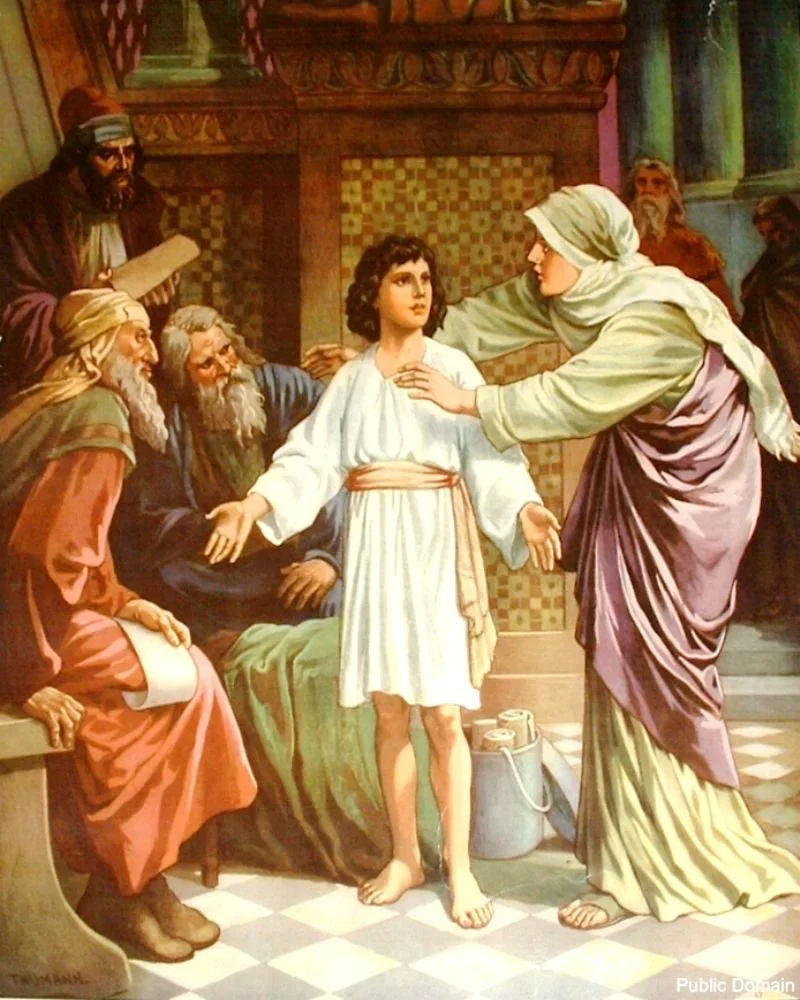1. The incarnation of the Son of God.
John 1:1-18
The prologue to the Gospel of John is at the same time a fitting introduction to the gospel story in general, and to the life of Jesus. It testifies to where Jesus came from and why he came into the world. From the outset it places the person of Christ, his true divinity and his true humanity, and the purpose of the incarnation of the Son of God in a clear light.
Christ is called the Word here. He is the personal Word. He is the Word “which God has spoken from eternity, which God has given birth to.” (Brenz) Just as the thoughts of the heart are expressed in the word of a person, so this Word has come from the inner being of God. “God in eternity, in his majesty and divine nature, has a word, speech, conversation or thought in his divine heart with himself, unknown to all angels and men.” (Luther) This Word was already in the beginning. In the beginning, when all things were created, it was already there. It is from eternity. And the Word was with God. There are two separate persons, the Word and God, the Son and the Father. But these persons are in the closest fellowship with one another. And God was the Word. The Word was himself God by nature, essential, whole, full God. It came forth, was born, from the nature of God. All things are made through him. The Word is the creator of all things. In him was Life, the fullness of life. Everything that lives has life from him. And the Life was also the Light, the salvation of mankind. It is already testified to as such in the Old Testament. The Light, the salvation shines in the darkness, in this wretched, sinful, lost and damned world. And the darkness has not understood it, has not grasped it. That is the nature of this evil world: it rejects salvation, it is an unbelieving world.
John, the man, the prophet, sent by God, testified of the Light, of the salvation in Christ, so that all through him, through his testimony to faith. Christ, the Light, is known to men only through the Word, through testimony and preaching, and is grasped only through faith. The true Light, which enlightens and blesses every human being who becomes light and blessed, was already coming when John bore witness, ready to show itself to men. It was already in the world, although the world that came into being through it did not recognize it. The world no longer knows its Creator. He then came into his own, appeared among his people Israel, and his own did not receive him. But some received him, and to them he gave power, the high privilege of being and being called children of God.
Those who believe in the name of Jesus Christ are children of God, children who are not born according to the flesh but spiritually, of God. Through faith in Christ, man is born again.
The holy Evangelist points out right from the start the different attitudes of men towards Christ, the great contrast between faith and unbelief.
Now it is said in plain, clear words what is meant by the entry of light into the world. The eternal Word became flesh, a man, like all men, only without sin. The apostles, his contemporaries, saw his glory, a glory as of the only begotten Son of the Father. Christ, the Word, is now called the only begotten Son of the Father. God has many children, but only one Son, who was born of him, of his being, and is thus himself God by nature.
The only begotten Son of God has the glory that belongs to God. God’s glory, which the Old Testament already speaks of, includes all the divine attributes in which the divine nature is revealed, e.g. omnipotence, omnipresence, omniscience. People have seen the glory of the only begotten Son of God. They had the man Jesus before their eyes. But it was precisely through the flesh, through the human nature of Christ, that the divine glory shone through. When the eternal Word became flesh, it imparted its divine glory and majesty to its human nature. “The Word became flesh and dwelt among us.” The incarnate Son of God lived and walked among men in a humble form. And the people who saw this humble Jesus walking on earth saw his glory. The Son of God, when he became man and took on the form of a servant, did not give up or surrender anything of his divine glory. This man Jesus, who walks on earth in humility, is the all-knowing, all-powerful God, and an all-knowing, all-powerful man. Of course, he did not always show and use his divine glory, but kept it hidden behind the form of a servant. But when he performed miracles, spoke, and taught, he revealed his glory to men. John had already testified of this very Word made flesh, and said that the one who was to come and appear after him had preceded him, had a higher rank, greater dignity, because he was before John, because he is the eternal God.
But here, at the beginning of his Gospel, the Evangelist also recalls the purpose of the incarnation of the Son of God. The Word made flesh was full of grace and truth. The Bible was given through Moses, grace and truth came through Jesus Christ. In Christ, the saving grace of God appeared to mankind. Through his incarnation, through his human life, suffering and death, the Son of God acquired God’s grace, favor and pleasure for sinful mankind. And this grace is the truth, the true good, which alone satisfies and blesses mankind. The only begotten Son, who is in the bosom of the Father, who also, when he became man, was and remained in the bosom of the Father, has declared to us what he has seen and heard from God above, what the Father has decided within himself, what God’s mind is toward men, that God is merciful to sinners. From the fullness of Christ we all, all believers, have received grace upon grace. And precisely by receiving grace and becoming believers, we have become blessed children of God.



